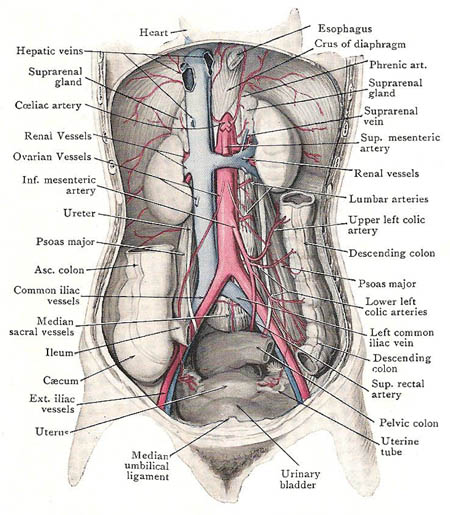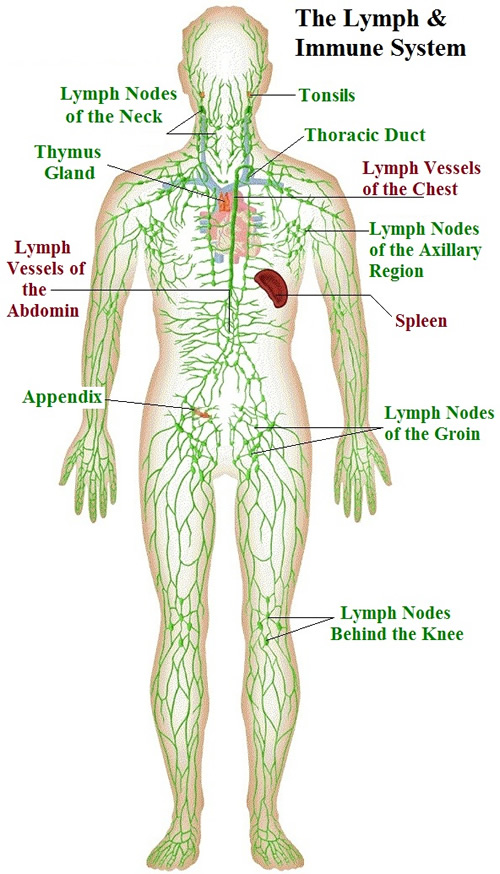Lemme talk to you for a second about breathing, y'all. 1. Venal return pump: you know how the heart pumps blood away from the heart to the arteries? Well, when it’s time to make the return trip through the venioles to the veins back to the heart to get re-oxygenated, that no longer gets the job done. The blood slows down so much in the capillary beds in order for oxygen exchange to happen with body tissues that once it reaches the veins it can’t get the speed back up on its own. (Heart–>arteries–>capillary beds–>veins–>heart is how blood circulates.)
So the body relies on other pumps. In the limbs, muscle movements contribute to venal return–but that only gets it into the vena cava, a giant blood vessel in the torso. (It's the blue guy on the left below.)

From there, one of the main ways that de-oxygenated blood gets back to the heart is through what we call “belly breathing.” You see that thing in the top of the abdomen that looks kinda like a church ceiling? That’s the diaphragm muscle. When you breathe into your belly, you’re not actually breathing into your belly: you’re contracting your diaphragm, which a) allows the bottom portions of your lungs to expand and fill all the way, and b) presses down on your stomach, intestines, liver, and the rest of your guts, causing them to swell outwards.
This also presses on the inferior vena cava, which squishes blood towards the heart like toothpaste out of a tube.
tl;dr: breathing improves blood circulation.
2. Lymphatic pump: there’s this thing called the lymph system (also called the immune system). It’s kinda like the circulatory system in shape, except it functions to filter toxins out of our bodies. You know lymph nodes, right? Those little bumps in your neck, armpits, and groin that get swollen when you’re sick? Well, they’re swollen because they’re working to fight off whatever pathogen you’ve got in you. There’s a whole network of vessels that carry crap to the nodes in order to be filtered.

Lymph is a gooey mess of proteins and pathogens that are sorta hanging out in the body tissue and eventually gets picked up by the lymph vessels, a delicate network that acts as a kind of sewage system for the body, moving the lymph through various cleaning points (the lymph nodes) that are full of white blood cells that attack and kill the pathogens before it dumps the filtered and (hopefully) purified result back into our heart. Unfortunately the lymph system doesn’t have its own pump either, so it, too, relies heavily on breathing to return filtered and clean lymph fluid back to the circulatory system. This improves the lymph system’s ability to fight off pathogens.
tl;dr: breathing improves the function of your immune system and overall ability to fight diseases.
3. Improved sleep and relaxation: deep breathing has been shown to trigger the parasympathetic nervous system.
The parasympathetic nervous system is part of the autonomic nervous system, which controls all the automatic or involuntary things that happen in our body like organ movements, hormone releases, etc. The parasympathetic side controls things like rest, relaxation, digestion, and sleep; the sympathetic side controls fight-or-flight response. We tend to live our lives on the sympathetic side, with lots of stress and work. Unfortunately that leads to the release of tons of a vicious little hormone called cortisol that SCREWS. UP. EVERYTHING. Like, if you’re running from a tiger it’s great, it does all sorts of things to the body to make it more efficient at fight-or-flight, but it also does awful things to pretty much every body system in the process. This is why stressed-out people get sick, can’t sleep, develop heart problems, have higher rates of neurological and mental disorders, get cancer, get diabetes…Google practically any disease + “cortisol” and there’s a link. I’m serious.
Breathing can change that. The way and amount that we breathe has been shone to drop us out of fight-or-flight and into rest-and-relax. This is why deep breathing helps with anxiety: when you’re anxious you’re locked in the sympathetic nervous system response, but deep breathing drops you into parasympathetic response and tells your body, hey, it’s all cool, man.
tl;dr: breathing improves everything.
